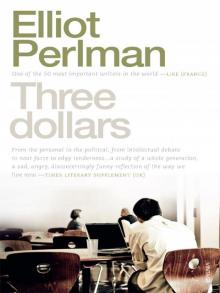- Home
- Elliot Perlman
Seven Types of Ambiguity Page 4
Seven Types of Ambiguity Read online
Page 4
She actually loves Simon to the point where she can become incredibly frustrated that she lacks the eloquence to express it. She makes a lot of money now, working for this up-market brothel. It’s aimed at the corporate sector. Men like your husband unwind in her company and with her assistance. They pay her to dress in a manner that doesn’t shame them and to undress in a manner that does. She would certainly be earning more than me now, but that’s not terribly hard. Please don’t underestimate her. She wants to get out of it too. She wants to be, of all things, an e-commerce entrepreneur when the market picks up, and a mother. She wants to be a mother when the market picks up! She’s talked to Simon about having a child with him. Don’t laugh. Whatever vestiges of middle-class sensibilities have stayed with Simon, and there are many, it is not these that keep him from Angelique. It is you, the myth of you. So please, don’t laugh at him or at Angelique. You have, perhaps, become shy around empathy. It makes you uncomfortable now. You can live without it in the elaborately designed artifice that surrounds the swimming pool Simon and I have sat by. You do really live without it. Perhaps people ought to feel with more imagination.
Even before I had started getting through to him, Angelique had gotten him out of bed, out of his room. They went for long walks together, often taking Empson. They would talk about you. She told him everything that happened to her, everything your husband said. Simon’s reactions varied. She could even make him laugh. After a while he was getting out on his own sometimes, shopping a little for basic food supplies or just walking around with Empson. Sometimes he would catch a train and stay on it for a couple of hours, reading or looking out of the window. You must understand how positive this was under the circumstances.
9. The circumstances and under them: He was in a shopping center, walking by himself, when he saw you and Sam. It was afternoon. He had never seen Sam. You had just picked him up from school, and the two of you went into the jeweler’s on the corner. It is unlikely things would have turned out the way they have had it not been for his chance sighting of you and Sam that afternoon. Had you seen him things might have gone differently. But you didn’t, and this was no coincidence. He didn’t want you to see him. From Sam’s school uniform Simon could work out the school Sam went to, and he figured that you must live in the area to be shopping there and sending your son to a local school.
He crossed the street and looked through the window from the side street. You were explaining something to the jeweler. Sam was turning a mobile watch display. It was taller than him. Given that Simon was afraid of you seeing him, he was undoubtedly taking an unnecessary risk in looking through that window. But it was a calculated risk. He was fascinated to see you, as an adult woman, a professional woman in a suit, being served by the jeweler while your little boy played with whatever was on hand. For Simon time had stood still. He had heard that you had a little boy and had wondered what he would be like. What would he look like? His curiosity gave way to a kind of excitement.
Does it sound funny? Looking through the window from the side street as you handed the jeweler your bracelet for him to examine, Simon watched you looking at your son. He was pleased to see you both together like that. The little boy came to you with something in his hand from the display, a watch. You gently admonished him and told him to put it back, all seemingly without sound in that darkened little corner shop. When Sam had done as you asked, you ran your fingers slowly through his hair and Simon thought that it must have felt good to Sam, to have done the right thing, to have known what to do and to have been able to do whatever would elicit even the briefest manifestation of your affection for him.
The jeweler took his time examining the bracelet under a lamp on the counter. He took what looked to Simon like a tiny screwdriver and began playing with the clasp on the bracelet, Simon’s bracelet, the bracelet he had bought for you from this very jeweler years before. You still wear it. You can imagine the effect on him when he realized this. He was desperate enough to take something like this as a kind of omen. Maybe this strikes you as sad? Perhaps it is sad but before you close your eyes to him, I ask you to remember the last time you took something as an omen or saw something as a metaphor for something else. You can’t remember, it was a long time ago? But you are functioning, aren’t you? You’re never in any danger. He took you, that elegant woman he saw in the jeweler’s with her little boy, as hope, for him, for everyone. Sam was the future, and here was the future looking to you for warmth and for guidance. If he put the watch back in the display cabinet, there would be no uncertainty about your response. He was loved unconditionally and, at least when you were with him, he knew it, it showed. Simon knew where you had come from and it filled him with hope that you and your young son could look the way you did now. After all, weren’t you born together, you and Simon, back in your early twenties, summoning up all that you could from the first two decades or so of games and rehearsals before finally inventing yourselves as adults in each other’s image?
You left the bracelet with the jeweler along with your name and telephone number. Sam wanted an ice cream. We don’t know whether he got it. Simon remained undiscovered. But you were fortuitously rediscovered, halo intact. I told you that you would love the way he sees you. Are you going to tell me you don’t understand any of this?
Angelique said you were cold. Simon wouldn’t have it.
“You wouldn’t say that if you’d seen her,” he said, pouring them both a drink. “You’re just going on her husband’s need to rationalize his own behavior. His infidelity needs a perception of coldness in her almost as much as it needs you. And the little boy, you should see the way she is with him, and the way he looks at her.”
“Sam, that’s his name,” she said, unimpressed.
“Does he talk about the little boy?”
“Not much,” she said.
“You’ve never said he’s said anything about him.”
“He hasn’t said much about him. Think about the circumstances in which I see him. He’s hardly going to bring out snapshots of his family.”
“But he has said something about him to you, apart from merely that he has a son and that his name is Sam. You told me.”
“He’s six and very bright. Takes after her. He admits this,” she said matter-of-factly.
“Well, he certainly looks like his mother.”
“Simon, you saw him for a moment through the window of a darkened shop. You don’t know what he looks like. You wouldn’t recognize him in a group of kids.”
He’s right, though, isn’t he? Sam does look like you. We know this now. He’s a very calm little boy, calm but inquiring, always investigating. Were you like this as a child? I suspect you were. Somewhere along the way, we lose our curiosity until we accept and then expect that we don’t know, that we cannot really explain very much at all. Just as he idealized you, Simon idealized your son and this is where it starts. Well, this is where the recent chronology starts, the one that leads me to you.
Simon began walking to your son’s school in time for lunch, not always, but often, just to watch him while he played. He didn’t do it every day. He wasn’t able to. The downward mood swings led him back to his bed. The near euphoria he experienced seeing you by chance in the jeweler’s was soon met with waves of an equal and opposite mood. A pedestal always doubles as a measure of sorts. If you invented your adult selves together, that is to say, if you were in some sense born at the same time, why was he following you and your son in this pathological way, humiliating himself to himself and, potentially, to you. What if you did see him one day? How could he explain himself, all that he had become? Would you blame him for it? What would he do if you looked at him with horror in your eyes? The papers tell it every day, there’s no work anywhere and, anyway, teachers are just leeches on the public purse. Right? What if you bought this line, too? You dress as though you do. Forgive me. I don’t mean to be insulting. I simply want you to see yourself as he sees you.
If you weren’t inspiring
him, intriguing him, and getting him up out of bed, you were destroying him, holding up to him the cruelest double-sided mirror imaginable. On one side there was the Simon as he was when you knew him, with all his promise—and on the other side, a stagnating man with a sorry taste for late liquid breakfasts.
On those days when one of us got him out, he often went to see Sam. There is a definite calm about Sam. Simon keeps coming back to this. Sam is very comfortable with himself and this probably enhances his attractiveness to other children. At an age when boys are either trying to outdo each other, trying to be the boss of the game or else simply content merely to be included, it is extremely rare for the sheer presence of a little boy to have such an effect on the others as to have them nominate him their leader. But this has happened. Simon has seen it.
From just outside the school grounds he saw some little boys attempt to arrest the natural chaos that threatened their enjoyment of a football. A boy, taller than the others, talked above the rest. Perhaps he owned the ball. He jumped excitedly as he spoke so that he seemed even taller than he was. He ignited the collective imagination with an idea. It must have seemed inspired: Leave everything up to Sam. Soon most of the other little voices were nominating Sam for captain, too. Sam, Sam. The way Simon tells it, they didn’t fully understand the concept of a captain in the context of sports since they chose only one. He was to be the captain of both teams. They were crudely electing someone to organize them, to make the rules governing the use of the ball. They chose Sam as their captain. Why? It wasn’t even his ball.
He is a handsome and capable little boy, not the fastest or the tallest, or even the smartest, but he is still tall, fast, and smart. But more than this, he is quietly assured and very curious about the world around him. He likes to be able to make sense of things and, usually, he can. He is used to experiencing what he expects to experience. He has received more than the usual positive reinforcement from his teacher and from you and your husband, albeit all of you variously motivated. Simon attributes Sam’s balance and calm to you. He said that the combination in Sam of an absence of both fear and arrogance is what marks him clearly as your son. You see how he remembers you? I told you. There is so much to be learned about someone from the little they remember and label “the past.”
You have heard Sam read. You must have. Does anything strike you? Not about his reading; he reads well. Does anything strike you about what he is reading, about its content? If you pick up the thin volumes from which children are taught to read, you will see short, simple sentences such as: “Tom can run. Tom can jump. Run, Tom, run. Jump, Tom, jump.”
Think about this: the act of learning to read. A child is being made, almost certainly to some extent against his or her will, to sit still, pay attention, and to concentrate on the symbols, the letters. The teacher, if at all successful, will have stimulated a certain curiosity in the child, the satisfaction of which both requires and is the reward for his unnatural stillness. What does the child feel if he or she is obedient? What does he or she learn from the discomfort of the stillness and the concentration? Tom can run, but he can’t. Run, Tom, run. He has to feel discomfort in order to hear of someone else’s good fortune. The words describe Tom being told to do something pleasurable, which the young reader is being denied permission to do by the teacher.
Simon describes this as the first dichotomy in a child’s education, the dichotomy between that which is taught as good or right and that which the child actually knows to be true in his or her experience. Of course, for a highly motivated child like Sam, this is hardly a problem. The praise he receives merely for the mechanical act of deciphering the symbols makes the effort worthwhile. But surely, after a while, he will have to become self-motivated. One hopes his curiosity will be enough to keep him going. One day the praise won’t be there.
Simon identifies another problem with these readers or primers, as they used to be called. In the socialization of a child, the first people with whom he or she must learn to interact are the mother and father. Shouldn’t it be the case, then, that these texts present realistic scenarios encouraging legitimate expectations of parents in the child? What does the young reader get? There are never even the slightest differences between the parents. They never disagree. A child will know soon enough that something is wrong somewhere. There are two logically attractive alternatives. Either the stories are not true to life or else there is something wrong with the child’s parents. In either case, the difficult act of reading has let the child down; it was not worth it. The child was conned.
It is also one of the earliest sources of myth, the myth of eternal parental availability. Mother is always there. She is never preoccupied. She has no job and no desire for one. Her role is a cross between that of God and a slave. She is never tired, never suspects her husband, and never thinks that another man might just bring back the zest she knew briefly, a little boy’s lifetime ago before Tom could run. She sees Tom run but he sees nothing and, you see, there’s another lie.
Of course, nobody can always be there for a child. We have to leave them just to provide for them—and maybe even to sneak in some sort of a life for ourselves. Please believe me, I am not being critical. If you can afford it and your housekeeper is good with children or not bad with them, even Simon wouldn’t criticize you for taking some time for yourself. But, of course, it wasn’t Simon or me that you were worried about.
10. Your husband doesn’t always get told the whole truth. But Simon doesn’t hold that against you either. It’s just that gradually he has been gaining the impression that you have invoked Sam as a device for gaining some kind of secret autonomy from your husband. Simon’s concern is that Sam is not benefiting from this. I’m sure you’ve rationalized this to some extent. Don’t tell me. It goes along these lines: if you are happier, this will somehow trickle-down to Sam and maybe even to your husband; the trickle-down theory. Well, of course it sounds foolish once it’s actually articulated. Simon didn’t know exactly what you were doing on those days when your sister, your mother, or your housekeeper was picking up Sam from school. He couldn’t be in two places at once so he stayed near Sam, knowing that, sooner or later, you would return to him, smiling as though, and because, whatever had just happened had not happened.
But you don’t need my doubtful insights to see the possible consequences of leaving Sam with others. Your housekeeper picked him up from school one day. They walked home. Sam was sucking on a frozen Sunnyboy she had bought for him. Do you remember Sunnyboys? Simon does. It was a hot day and he walked slowly, kicking cans and stones as he went, whatever was in his way. It takes longer to get from A to B if you do this and by the time they had reached your house at the end of this particularly hot day, your housekeeper was just barely managing to hang on to her patience. Perhaps you have never seen her in this state. You should never hire somebody just because she smells like Johnson’s baby powder. She told him to finish the Sunnyboy outside. It was melting, and Sam was already sticky. He was really a bit of a mess with the sticky liquid on his hands and down the front of his school shirt.
When he was finished he carefully put the empty Sunnyboy wrapper on the grass near the edge of the pool and began kicking a plastic ball around the back garden by himself, back and forth. Simon felt tired just watching him. His energy seemed limitless, even in the heat. He kicked the ball from one end of the garden to the other and across, meeting it at the other end. He was puffing but showed no sign of stopping or even slowing down until, perhaps inevitably, the ball landed in the water. The momentum of the last kick took it away from the edge of the pool. He couldn’t reach it.
It was obvious to Simon that Sam had been thoroughly warned about the dangers of going in the pool without the supervision of an adult. He was by no means a timid boy but, nevertheless, throwing off his clothes and retrieving the ball from the water himself was clearly not an option. He became increasingly frustrated. There didn’t seem to be anything around that he could use to reach the ball e
ven just to tap it to the edge. He called to the housekeeper but she was in the kitchen preparing dinner. The sliding door was closed and she had the radio turned up. The music and the smell of onions frying poured out of an open window. Sam, almost crying in frustration, leaned over the edge and paddled the water with his hands to create a current. The ball began to move, but it moved away from him so he ran to the other side of the pool and began the same scooping motion from there. He had created a current strong enough to start sending the ball against the earlier current and back again. He began to work faster with his hands, impatient for his ingenuity to reward him. The radio played Roy Orbison. Sam was still calling your housekeeper’s name, angry with her, working furiously and breathing hard. The ball was nearing the other side.
Was it “Only the Lonely”? The repetition of her name, the heavy breathing, and the angry little splashes of his paddling in the water gave way to a new fury of hands flat against the surface of the water, slapping the water. It was like this. He was in. He fell. His school shoes were certainly heavy on him. He swallowed in fear, in terror, until the water surrounded him, inside and out. He had never known such distilled terror. Do you tell her what to cook each night in advance, or is it ad hoc? Does she have a general idea of what’s required? She’s to prepare dinner and leave Sam alone to grow up—a separate person—like you, sink or swim. Only the lonely could know the way I feel. The onions were frying. She’s at the fridge. She’s somewhere. Where are you while your son is drowning in one of those tangible manifestations of the medieval bargain struck between your husband’s accountant and your parents’ ambitions for you?

 Maybe the Horse Will Talk
Maybe the Horse Will Talk The Adventures of Catvinkle
The Adventures of Catvinkle The Street Sweeper
The Street Sweeper Seven Types of Ambiguity
Seven Types of Ambiguity Three Dollars
Three Dollars The Reasons I Won't Be Coming
The Reasons I Won't Be Coming